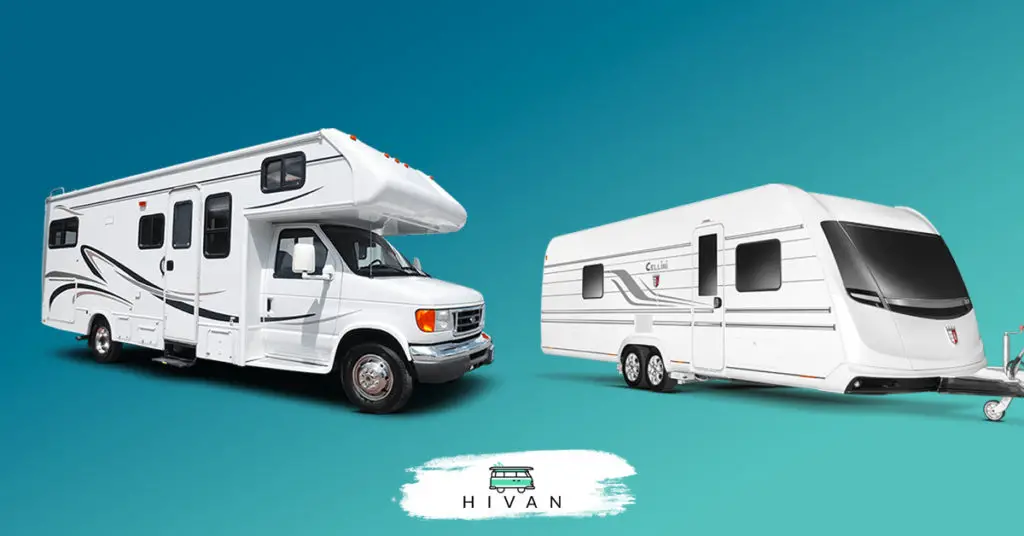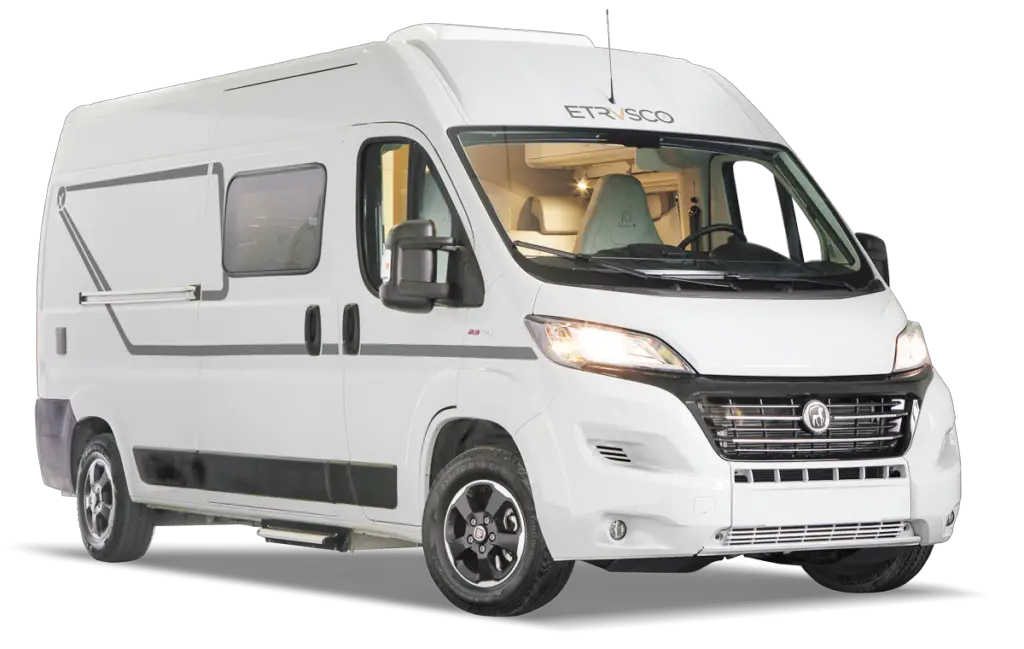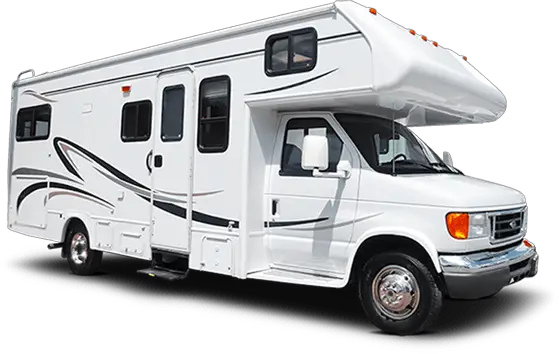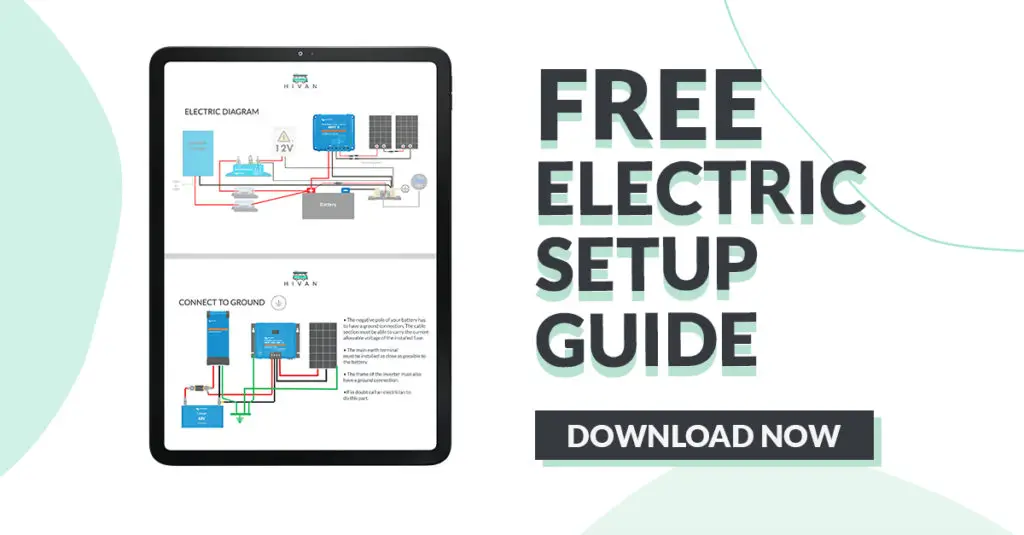Hi-van is supported by its audience. When you purchase using our links, we may earn an affiliate commission (no added cost to you). Learn more
An RV and a caravan are mobile homes that people use to travel, especially during extended road trips. While both types of vehicles offer a home on the go, there are significant differences between the two that you’ll want to consider if you’re planning to invest in either.

An RV is a motor-powered vehicle fitted out with basic living amenities, which you can live in and drive around when you need to. A caravan is a separate trailer with living amenities that are attached to a powered vehicle that transports it from place to place.
In this article, we’ll take a more in-depth look at RVs and caravans, along with the pros and cons of each vehicle.
RV: Basic Overview
An RV is a motor-powered vehicle fitted out with the basic living amenities, including a bed, kitchen, bathroom, tables, and various seating arrangements. “RV” is also an umbrella term used to categorize all homes on wheels.
The two most common types of RVs are motorhomes and campervans. Let’s talk more about them now.
Campervans

Campervans are smaller in size and are usually custom-built to function as an RV. They’re compact, making maneuverability straightforward and giving you easy access to most travel destinations.
While they’re smaller than the traditional idea of an RV, campervans are built to accommodate a range of amenities, including a kitchen and a bathroom in some cases.
However, campervans are often built for storage so people can park the vehicle at the ideal spot and set up camp wherever they choose to.
Motorhomes

Motorhomes are the type of vehicles usually referred to as an RV in most countries. It is generally larger than most vehicles, often resembling the size of a small truck.
These large homes are fitted out with adequate bedding and cooking facilities, often including burners, an oven, a microwave, and the works. For the purpose of this article, we’ll use this definition of an RV when comparing it with a caravan.
An RV is often built on a long wheelbase and can be driven in most countries, in some cases with a special license. They are ideal for those looking for a mobile home to live in during road trips, family outings, or extended vacations.
Find this content useful 🙂 ?
Subscribe to our Newsletter and get a free Solar Electric Diagram + shopping list.
Pros of an RV
Now that we’ve properly defined what an RV is, let’s take a look at some of the advantages of having one at your disposal.
1. Quick Setup
The best part about an RV is the fact that everything you need is already inside the vehicle so that you can camp anywhere you’d like to without having to worry about setting things up. There’s zero effort required before you stop for the night as the vehicle is already stocked with the essentials found in a home.
Similarly, setting off for a trip is a lot easier without the hassle of preparing for every eventuality. All you need to do is make sure your RV is stocked with the right supplies before setting out on your journey.
RVs come furnished with the basic living necessities, including bedding, a toilet, and plenty of cabinets to store your essentials. You can store toiletries, blankets, pillows, and any other item you’ll need for the journey.
You may want to keep a stock of canned food and drinks in the RV even when it’s not in use.
2. Convenient Travel
An RV helps eliminate the stress that usually accompanies long journeys, as you don’t have to deal with flight tickets or hotel reservations and the strict deadlines that come with them. It also grants you the freedom to travel when it’s most convenient and when everyone is ready to get moving.
Sometimes the adherence to flight or train timings can get stressful as you need to arrive at the airport or station at a particular time. But with an RV, you can delay a departure for hours if you need to, making the journey more relaxing and enjoyable.
3. Fewer Expenses
While you may end up spending more money on fuel, an RV can actually help you save money in the long run.
- Cheaper than hotels: Booking hotel rooms for an entire family can be an expensive affair, even if you’re planning to stay for a few days. An RV eliminates these expenses by giving you a comfortable, mobile home you can stay in whenever you stop for the night.
- Save on food: RVs are fitted with a basic kitchen for your daily requirements. While you may not be able to cook anything fancy, at least you’ll have the space to make the kind of food you want with regular groceries you can purchase at any convenience store. A large part of travel expenditure includes the money spent on food, which is quite excessive when you’re regularly eating on the go.
- Less-Expensive Commute: Train and flight bookings can be a significant drain on your finances and can even soar to thousands of dollars when a large group is involved. You can avoid the brunt of ticket prices by traveling in an RV, and as a bonus, you get to enjoy the scenery during your trip.
Cons of an RV
Now let’s take a look at a few disadvantages of using an RV to travel.
1. Expensive Investment
The startup cost to own an RV can be incredibly high, especially if you’re looking for one with specific amenities, like a refrigerator or an oven. And the prices may be even higher if you’ve got a large family you want to go road tripping with, as you’ll need a larger vehicle.
You can also opt for renting out an RV for your holiday, which costs a lot less than buying one.
2. Maintenance Costs
Owning an RV gets even more expensive when you consider the costs of maintaining one.
RVs are notorious fuel guzzlers, and you’ll end up spending quite a lot on traveling from place to place. But aside from fuel, you’ll also have to restock the vehicle with propane to run refrigerators and stoves and pay for cleaning and servicing, which can be quite a pinch on your finances.
Most RVs come with a generator that keeps the electronics running, and maintaining and refueling the generator adds to the overhead costs.
Finally, you’ll also have to get the septic tank emptied regularly, and this cost is unavoidable whether or not you’re renting the RV.
3. Parking Problems
It can be pretty challenging to get parking for an RV simply due to the size of the vehicle. Many counties and towns won’t have space for you to park your van, making commuting quite troublesome from time to time.
4. Restricted Access
Some travel destinations are inaccessible by RV due to the sheer size of the vehicle. Off-roading or driving through towns with narrow streets is impossible and will restrict the number of places you can visit.
And aside from this, some cities mandate low-emission vehicles on their roads, and certain types of RVs aren’t allowed within city limits. These are factors to consider when you’re traveling by RV.
Now let’s take a look at caravans and what they have to offer.
Caravan: Basic Overview
A caravan is a mobile home, but it’s not a vehicle that can be used to commute. Instead, it’s a trailer that needs to be attached to a motor-powered vehicle and towed from place to place. Although caravans are unpowered trailers, most come with power outlets or battery packs to run amenities like refrigerators, lights, and certain kitchen appliances.
The fundamental difference between an RV and a caravan is the fact that a caravan can’t be transported from place to place without another vehicle.
Due to their limited mobility, caravans are used more frequently for camping trips.
Pros of a Caravan
Let’s take a look at some of the advantages of owning a caravan.
1. Less Expensive
While buying a caravan will cause a tiny dent in your savings, the cost of owning one is a lot less than owning an RV. Caravans are often designed as empty trailers with basic living amenities.
Caravans don’t run on fuel and require another vehicle in order to move from place to place. The use of a regular motor vehicle drastically cuts down on the fuel you need to travel with the shelter of a mobile home.
Caravans are also easier to maintain as they don’t require the same level of service as a motor-powered vehicle.
2. Easy to Restock While On the Road
A caravan can be quickly detached from the motor vehicle you’re using to transport it from place to place. This facility makes it easier to park a caravan in the ideal camping spot and use your car to head into town to pick up supplies.
Unlike an RV, where your home needs to be lugged around wherever you go, a caravan can be separated so you can still enter certain towns and cities if required.
3. Reduced Maintenance
A caravan is usually taken to a camping spot so the family can enjoy the outdoors with the comfort of a home nearby. The towing vehicle is often detached and used to explore places that the caravan can’t enter.
As such, the caravan picks up minor wear and tear during a journey, drastically reducing the need and cost of regular maintenance.
4. Room for Customization
Caravans, when stripped down to their basic form, are large trailers containing home amenities. This open space allows caravan owners to customize their trailers in any way they want, from the kind of amenities they want to the location and placement of each amenity.
On the other hand, motor-powered RVs are built with a specific design in mind with little room for customization.
Cons of a Caravan
While caravans can be an excellent way to take a vacation with the whole family, this mobile home comes with its share of disadvantages.
1. Investing in a Tow Vehicle
While caravans allow you to detach your tow vehicle for shorter trips, few cars in the market are powerful enough to move a caravan.
You may have what most people consider a powerful four-wheel drive, but you’ll need to do a bit of research and invest in a vehicle that can lug around that heavy load. And it’s often an expensive investment.
2. Less Safety
Most caravan owners detach their caravan when heading into town to restock on supplies. However, leaving a caravan unattended can be dangerous, especially in populated parts of the world, where anyone can break into the trailer and steal from you.
3. Unsuitable on Certain Terrain
While caravans can be easily transported with the right vehicle, they tend to be more rickety than RVs and unstable on certain roads. It’s especially hazardous to take a caravan to hilly or muddy areas as towing them along can lead to accidents.
Caravans are also more challenging to maneuver in rough weather or when you’re stuck in traffic, making travel a bit annoying from time to time.
4. Limited Space
Caravans are often smaller than RVs, making storage a little more complicated. They’re usually not fitted with built-in cabinets or lockers where your toiletries and other essentials can be stored.
The limited storage can make it difficult to transport all the essentials you need for a camping trip.
Aside from storage space, caravans generally tend to be smaller, with less room for bedding, kitchen amenities, and any other facilities you would require in a home. The smaller size can make a caravan feel a little cramped, especially when traveling with a big group.
Final Thoughts
Both RVs and caravans are mobile homes that make for a great getaway from the monotony and hassles of regular life. And if you’re parking in the right spot, you can even continue working from your RV or caravan.
Now that you have an understanding of the primary differences between these two mobile homes, assess your financial situation and your travel needs so you can make an informed decision on which one to invest in.

